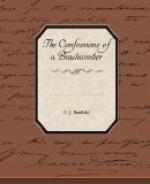The blossoms of the melaleuca come in superabundance, pale yellow spikes, odorous to excess. When the trees thus adorn themselves—and they do so twice in the year in changeless fashion, in the fulness of the wet season—the air is saturated with the odour as of treacle slightly burnt. The island reeks of a vast sugar factory or distillery. Sips of the balsamic syrup are free to all, and birds and insects rejoice and are glad. A perpetual murmur and hum of satisfaction and industry haunt the neighbourhood of the trees as accompaniment to the varied notes of excitable birds. Chemists say that insects imprisoned in an atmosphere of melaleuca oil become intoxicated. Insects and birds certainly are boldly familiar and hilarious during the time that the trees offer their feast of spiced honey.
Every tree is a fair, and all behave accordingly, chirping and whistling, humming and buzzing, flitting and fluttering, in the unrestrained gaiety of holiday and feast-day humour. Always an impertinent, interfering rascal, the spangled drongo, under the exhilarating influence of melaleuca nectar, degenerates into a blusterer. He could not under any circumstances be a larrikin; but the grateful stimulant affects his naturally high spirits, and he is more frolicsome and boisterous than ever. The path between the coco-nuts to the beach passes close to two of the biggest trees, and from each as I strolled along, one sublime morning when the whole world was drenched with whiffs, strong, sweet and spirity, a drongo, flushed with excitement, flew down, bidding me begone in language that I am fully persuaded was meant to provoke a breach of the peace. The saucy bullies, the half-tipsy roysterers, tired of domineering over every participator of the feast, dared to publicly flout me, defiantly sweeping with their tails the air, as an Irishman, “blue mouldy for want of a bateing,” sweeps the floor with his coat, and chattered and scolded in every tone of elated bravado. The bibacious drongo can be as demure as any. When he comes to dart among the eddying insects, glorying in the first cool gleams of the sunshine, he will take his ease on a mango branch, make jerky bows and flick the fine feathers of his tail, and “cheep” in timorous accents. He is sober then, quite parsonified in demeanour; his speech “all in the set phrase of peace,” and would be scandalised by the mere mention of melaleuca nectar.
A professor of physiology asserts that rabbits are very curious when under the influence of liquor, and that a drunken kangaroo is brutally aggressive. The drongo is merely pugnacious and noisy. Having heard of the melancholy effects of over-indulgence in melaleuca nectar, I was not at all disposed to judge of the misbehaviour harshly or to take personal offence; for the drongo is a respectable bird, and the opportunities for excess come but twice a year. Are not the tenses of intoxication infinite?
This is not a prohibition district, and if the happy, unreflective bird chooses to partake even to excess of the free offering of Nature, the quintessence of the flowers of the tree distilled by sunshine, why should not he? Am I the only one to be “recompensed by the sweetness and satisfaction of this retreat”?




